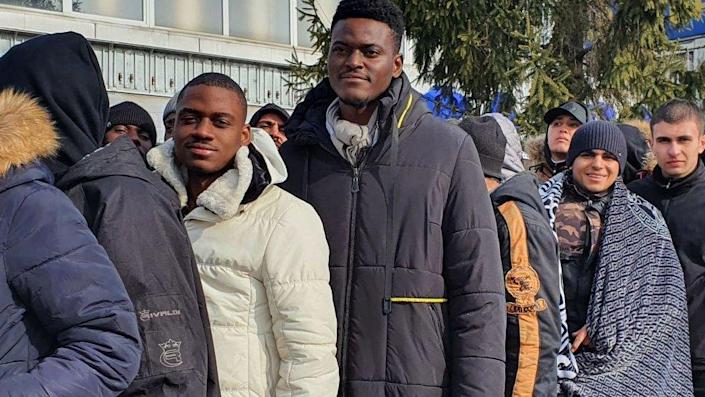
The Russian invasion of Ukraine has caused a mass exodus of civilians, including thousands of international students from Africa, Asia and the Middle East.
Ukraine was home to over 76,000 foreign students, according to government data from 2020.
Nearly a quarter of the students were from Africa, with the largest numbers coming from Nigeria, Morocco and Egypt.
India easily accounts for the highest portion with over 20,000 students.
The students – studying medicine, engineering and business – are an important part of the country’s economy.
But, as Russia launches the biggest European invasion since the Second World War, thousands of them have fled, hundreds are still trapped, and many remain uncertain about the fate of their education.
What was the attraction of Ukraine?
Ukraine has long appealed to foreign students, which can be traced back to the Soviet era, when there was a lot of investment in higher education and a deliberate attempt to attract students from newly independent African countries.
Now, Ukrainian universities are seen as a gateway to the European job market, offering affordable course prices, straightforward visa terms and the possibility of permanent residency.
“Ukrainian degrees are widely recognised and offer a high standard of education,” said Patrick Esugunum, who works for an organisation that assists West African students wanting to study in Ukraine.
“A lot of medical students, in particular, want to go there as they have a good standard for medical facilities,” he added.
Desmond Chinaza Muokwudo, a Nigerian student who had been based in the city of Dnirpo, said he was attracted by the relaxed admission requirements and the cheap cost of living compared to other European cities.
He enrolled at the University of Customs and Finance less than three months ago.
Many courses are offered in English, but the 30-year-old was undertaking a preliminary Ukrainian language course, before moving on to study international relations.
“I was a welder back in Nigeria and I needed an education to accomplish things,” he told the BBC from a hostel in Poland after fleeing the conflict.
“Ukraine was the best option for me.”
Where are the students now?
Like Mr Muokwudo, more than 10,000 other African students have managed to flee the conflict and enter neighbouring countries, according to the EU.
There have been reports of foreign students receiving racist treatment at the border, with social media footage showing Ukrainian officials preventing some from crossing.
Hundreds of students are still believed to be in Ukraine, but it is hard to confirm exact numbers.
One Indian student was killed when he ventured outside to buy some food.
Christophe, a 22-year-old Cameroonian student, spoke to the BBC from inside a basement in the southern city of Kherson, which has been taken by Russian forces.
“When the bombardments start, we go inside, it’s a very little hole,” he said while the fighting was still raging.
He said it was now relatively calm but there was a lockdown during the day and more than two people were not allowed to be together outside.
The international business student was one year into his bachelor’s degree at the Kherson National Technical University when the fighting began.
“It’s difficult to imagine finishing your studies in this sort of environment,” he said.
In another part of the city, Mamady Doumbouya, a computer science student from Guinea said: “I want to go back to my country, we can’t study in war.”
He spoke to the BBC from inside a dark basement surrounded by his classmates from Gabon, Senegal, and Cameroon.
“We don’t have water, we don’t have light,” he said.
What are governments doing to help?
Ukraine halted all civilian flights when the invasion began on 24 February.
African governments have been scrambling to evacuate their citizens from the country, with some organising flights back home to those who make it across the border.
Ghana was the first African nation to welcome home a group of students on Tuesday.
Speaking to the BBC after landing in the capital, Accra, student Jared Otumfuo Catey said: “A few days ago, I didn’t know I’d be here right now. I’m feeling grateful that I made it through and I’m safe.”
Nigeria said it would follow suit and offer flights for those wishing to return via Romania, Hungary, and Poland.
South Africa’s ambassador to the Ukraine told the BBC that he had to leave Ukraine for his own safety but that he had been working hard to secure the exit of South Africans and other foreigners from the country.
South Africa’s ambassadors in both Poland and Hungary have also gone to the borders to help people get through, he said.


The Ukrainian government has launched an emergency hotline for Africans and Asians fleeing, according to the foreign minister.
In a tweet, Dmytro Kuleba said the authorities were “working intensively” to ensure the safety and passage of African and Asian students.
Will they be able to finish their studies?
Having invested a lot of money in an education in Ukraine, many students have told the BBC that they were torn between returning home or staying in Europe to complete their degrees.
Jessica Orakpo, a sixth-year medical student at the Ternopil National Medical University, was four months away from graduating when the Russian troops invaded.
“I’m stuck now, I can’t move forward with my education because my school has all my documents,” she told the BBC on her way to the Hungarian capital, Budapest.
“I don’t have time to start all over again and I just want my degree. Maybe I can finish my master’s somewhere else.”
Foreign students in Ukraine get temporary residence for the duration of their studies, but this does not extend to neighbouring countries.
Mr Muokwudo said he would try to finish his course elsewhere in Europe, if all else fails.
“I’m going to stay here and see if the situation improves,” he said.
“Going back to Nigeria is not an option.”




